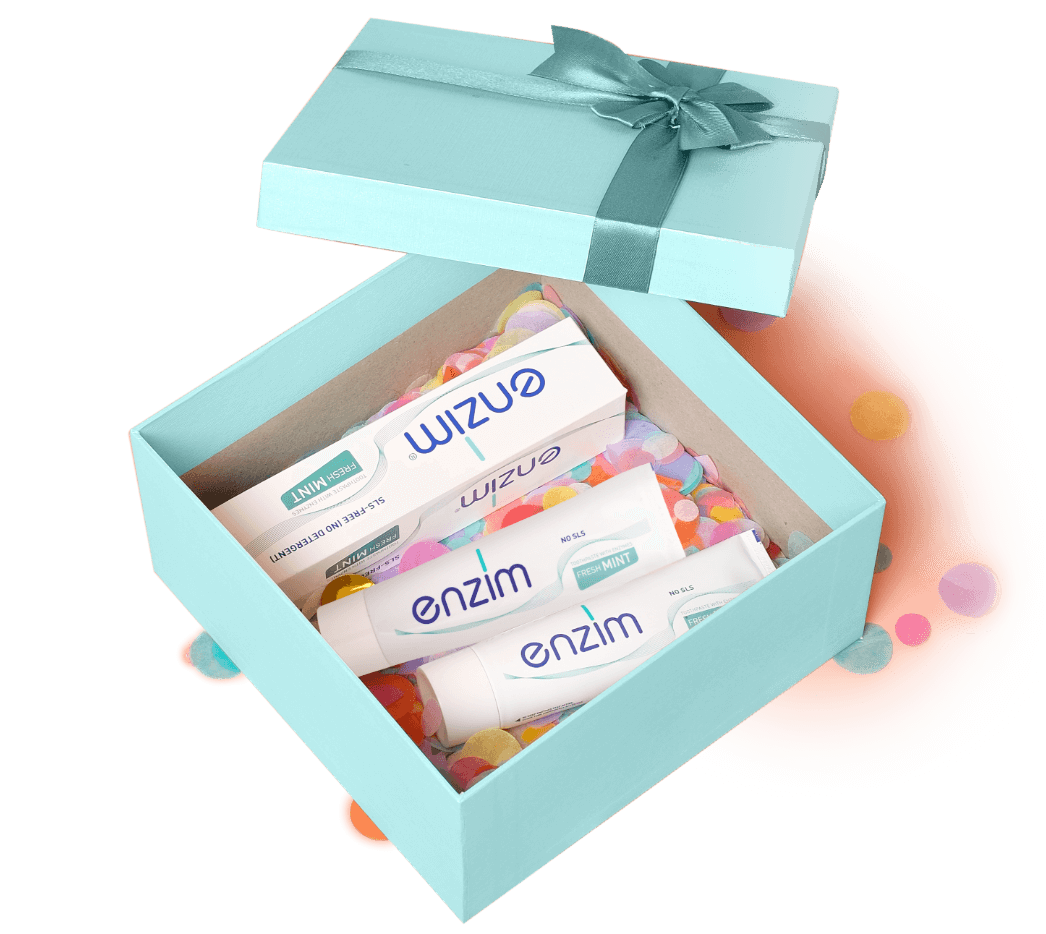Sensitive Gums? Signs You Need to Switch Your Toothpaste

Sensitive Gums? Signs You Need to Switch Your Toothpaste - Enzim Singapore
If you’ve ever experienced discomfort in your gums, you know how frustrating and distracting it can be. Sensitive gums can make eating, drinking, and even brushing your teeth uncomfortable. While gum sensitivity might seem minor at first, it can sometimes signal underlying oral health issues or the need for a change in your oral care routine. One simple yet effective solution could be switching to a toothpaste specially formulated for sensitive gums. But how do you know if it’s time to make the switch? In this article, we’ll explore the key signs of gum sensitivity, the role of toothpaste in gum health, and how to choose the right product for your needs.
Signs You Have Sensitive Gums
-
Pain or Discomfort While Brushing or Flossing If you feel pain, tenderness, or irritation every time you brush or floss, it could be a sign that your gums are sensitive. This can happen for several reasons, including aggressive brushing, improper flossing techniques, or the use of a toothpaste that is too harsh for your gums. Over time, this discomfort can discourage proper oral hygiene, leading to more significant issues.
-
Bleeding Gums Occasional bleeding might occur if you’ve brushed too hard or skipped flossing for a while. However, if you notice frequent bleeding when brushing or flossing, it’s a clear indicator that your gums are inflamed or irritated. Persistent bleeding could also point to early gum disease, which requires immediate attention.
-
Red or Swollen Gums Healthy gums should look firm and pink. If your gums appear red, puffy, or swollen, it’s a sign of irritation or inflammation. This could result from plaque buildup, gum infection, or even a reaction to the ingredients in your current toothpaste. Swollen gums are often tender to the touch and can make routine oral care more challenging.
-
Receding Gums Gum recession occurs when the gum tissue pulls away from the teeth, exposing the roots. This can increase sensitivity to hot, cold, or sweet foods and beverages. Receding gums are often a sign of advanced gum irritation or improper oral care habits and can lead to further complications if not addressed.
-
Sensitivity to Hot, Cold, or Sweet Foods While tooth sensitivity is commonly associated with exposed enamel, gum sensitivity can also make it uncomfortable to enjoy hot coffee, cold ice cream, or sweet treats. This discomfort could be a sign that your gums are inflamed or that your current toothpaste isn’t providing the protection and care your gums need.
-
Persistent Bad Breath Chronic bad breath, also known as halitosis, can be linked to gum issues. If your gums are inflamed or infected, bacteria can accumulate in pockets around the teeth, producing an unpleasant odor. This is often an early warning sign of gum disease.
Why Your Toothpaste Matters
Many people underestimate the role toothpaste plays in maintaining gum health. Standard toothpastes often contain strong abrasives, foaming agents, or artificial flavors that can irritate sensitive gums. Switching to a toothpaste designed specifically for gum care can help soothe irritation and promote healthier gums over time. Here’s why it matters:
-
Gentle Formulas: Toothpastes for sensitive gums are made with mild ingredients to clean teeth effectively without causing further irritation. They avoid harsh abrasives and chemicals that can exacerbate sensitivity.
-
Soothing Ingredients: These toothpastes often include natural calming agents like aloe vera, chamomile, or tea tree oil to reduce inflammation and soothe discomfort.
-
Targeted Protection: Ingredients like stannous fluoride and potassium nitrate not only help protect against cavities but also reduce gum sensitivity and strengthen the enamel. This dual action ensures long-term oral health benefits.
-
Anti-Bacterial Properties: Many sensitive gum toothpastes contain ingredients that fight bacteria and plaque, reducing the risk of gum infections and improving overall oral hygiene.
When to Switch Your Toothpaste
Recognizing the signs of gum sensitivity is the first step, but knowing when to take action is just as important. You should consider switching to a specialized toothpaste if:
- Your gums are frequently sore or inflamed. Regular discomfort is a sign that your current toothpaste might not be addressing your needs.
- You’ve been diagnosed with gingivitis or another gum condition. Sensitive gum toothpastes can complement professional treatment and help maintain gum health.
- Your current toothpaste feels too strong or causes stinging. Toothpaste with harsh ingredients or whitening agents can irritate sensitive gums.
- You want to prevent gum issues before they start. Even if you’re not experiencing significant discomfort, using a toothpaste for sensitive gums can help maintain healthy gums and prevent problems down the road.
How to Choose the Right Toothpaste
Choosing the right toothpaste for your gums can feel overwhelming with so many options available. Here are some tips to help you find the best one for your needs:
- Look for ADA Approval: Toothpastes with the American Dental Association (ADA) seal meet strict safety and effectiveness standards.
- Read the Label: Check for active ingredients like fluoride, which protects against cavities, and potassium nitrate or stannous fluoride, which address sensitivity.
- Avoid Harsh Additives: Steer clear of toothpastes with alcohol, strong mint flavors, or whitening agents, as these can irritate gums.
- Consider Natural Options: If you prefer a more natural approach, look for toothpastes with herbal extracts like aloe vera, chamomile, or tea tree oil.
- Consult Your Dentist: Your dentist can recommend the best toothpaste for your specific needs based on your oral health.
Additional Tips for Gum Care
Switching to a specialized toothpaste is an important step, but it’s not the only thing you can do to care for your sensitive gums. Here are some additional tips:
- Use a Soft-Bristled Toothbrush: A toothbrush with soft bristles is gentle on gums and reduces the risk of irritation.
- Brush Gently: Avoid brushing too hard, as this can damage gums and enamel.
- Floss Daily: Flossing helps remove plaque and food particles from between teeth, reducing gum irritation.
- Rinse with a Mouthwash: An alcohol-free mouthwash designed for gum health can help reduce bacteria and soothe gums.
- Visit Your Dentist Regularly: Regular dental checkups can catch gum issues early and ensure you’re using the right oral care products.
Conclusion
Sensitive gums don’t have to be a source of ongoing discomfort or worry. By recognizing the signs early and switching to a toothpaste designed for sensitive gums, you can take control of your oral health. These toothpastes are formulated to provide gentle yet effective care, soothing irritation and protecting your gums from further damage. Pair this with a good oral hygiene routine and regular dental visits, and you’ll be on your way to a healthier, more comfortable smile. Don’t let sensitive gums hold you back—make the switch today and feel the difference!
